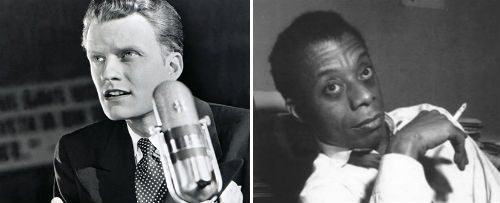Molly Worthen, “Evangelical Boilerplate: Billy Graham’s innocuous blend of showmanship and salvation”
Wacker notes Graham’s moral blindness a few times, observing that the preacher wanted too badly to please the powerful. He could not see the ways in which mainstream society coerces minorities, and was “sometimes simply incapable of understanding the motivations of social and cultural dissidents.” Graham came from a faith of prophets and martyrs but showed little knowledge of or interest in his own tradition’s capacity to challenge the status quo and plumb the human predicament. Scholars complained that he “displayed little awareness of ambiguity, irony, and paradox in Christian theology or in US history or anywhere else for that matter.”
In other words, Graham was a typical American evangelist. Celebrity preachers who become visionary social reformers always have been the exception to the rule. Most evangelists and missionaries are pragmatists: they worry more about the hereafter than the here and now, and they know better than to challenge social conventions too forcefully.
James Baldwin, “Faulkner and Desegregation”
Faulkner — among so many others! — is so plaintive concerning this “middle of the road” from which “extremist” elements of both races are driving him that it does not seem unfair to ask just what he has been doing there until now. Where is the evidence of the struggle he has been carrying on there on behalf of the Negro? Why, if he and his enlightened confreres in the South have been boring from within to destroy segregation, do they react with such panic when the walls show any signs of falling? Why — and how —d oes one move from the middle of the road where one was aiding Negroes into the streets to shoot them?
Now it is easy enough to state flatly that Faulkner’s middle of the road does not — cannot — exist and that he is guilty of great emotional and intellectual dishonesty in pretending that it does. I think this is why he clings to his fantasy.
Jeet Heer, “The New Republic’s Legacy on Race”
This type of language was partially a literary affect. The magazine was trying to be modern, vernacular, and street smart. But on a deeper level, the magazine’s writers seemed to be going out of their way to assure readers that while they took up the cause of political parity between the races, they weren’t so naïve to accept blacks as social equals.
Natasha Chart, “I Had an Ectopic Pregnancy, and Anti-Choice Laws Could Have Made My Experience Much Worse”
This isn’t how I wanted any of this to go. I didn’t go to my ultrasound hoping for a political statement; I wanted a due date. And odds are, you’re not one of the handful of people I was planning to share my news with this week. But it happened like it did, and there’s nothing to do but to lie here until this scar heals up some more and try to get my head around the facts of the situation.
Writing has become part of dealing with things like this for me. But as long as I’m at it, I couldn’t help but think about all the ways it could have gone differently if anti-choice laws prevailed where I live. It would have been worse in every way, for no sound reason. The best care I could have gotten was the immediate care that I did get. The best information I could have gotten was the medically accurate information that I did get. For women all over the country, when they’re faced with a pregnancy they have to decide to end — and I trust without hesitation that their reasons are right for them, because who would know their lives better than they do — it is worse in every way.















